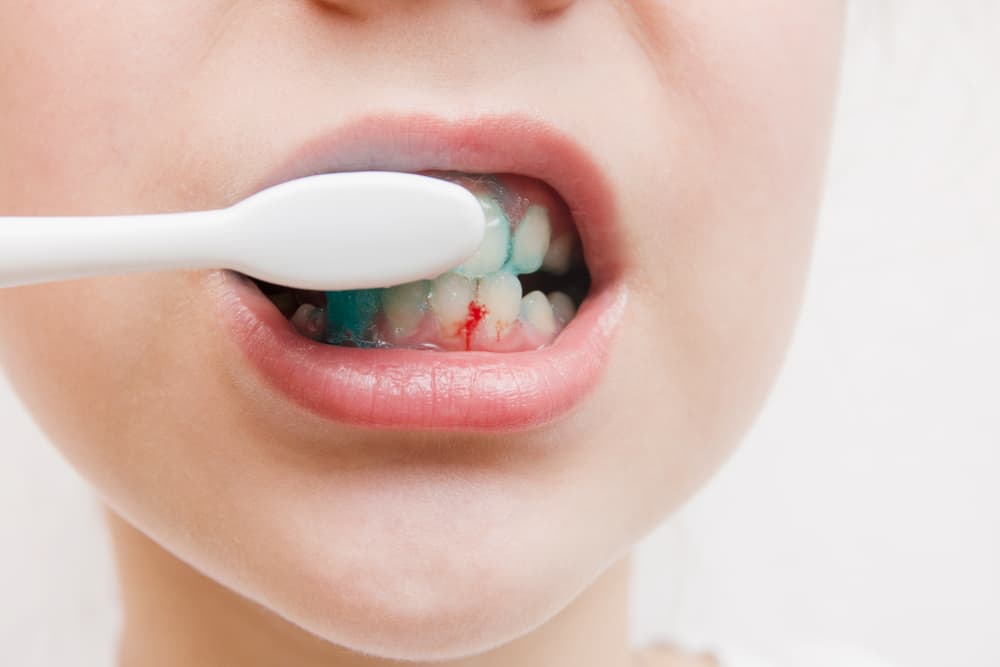6 Surprising Reasons Why Your Gums Bleed During Tooth Brushing

Although bleeding gums are the most common sign of gum disease, this problem can occur for some other reasons. While occasional bleeding is normal and can happen due to aggressive tooth brushing, constantly bleeding gums are often provoked by health conditions. The severity of the problem depends on the amount of blood and the frequency of bleeding. Let’s look at six surprising but common causes of bleeding gums:
1. You follow a diet that’s poor in essential nutrients
Following a healthy lifestyle and healthy diet is crucial for everyone. A well-balanced diet is key for not only a healthy body but also healthy teeth and gums. There are no miracle foods that will protect your gums against periodontal disease. These foods don’t exist. The only miracle is proper dental hygiene along with a balanced diet rich in all essential nutrients.
2. You’re taking certain medications
Certain prescription medications can increase your risk for both gum bleeding and swelling. Some blood pressure drugs and immuno-suppressants can also provoke gum inflammation and bleeding, while other medications can cause a dry mouth syndrome - another risk factor for gum issues. There are nearly 400 medications that can impact saliva production in your mouth including antihistamines, sedatives, anti-depressants, and anti-psychotics.
You need saliva to wash away food particles and eliminate the gum-irritating acids that are produced by bad bacteria. If you don’t produce enough saliva, it’s essential to have good dental hygiene since your mouth isn’t getting the beneficial effects of the saliva. Dehydration can also contribute to dry mouth, which is a culprit for bad breath and other dental issues.
3. You have gum inflammation (gingivitis)
Gum inflammation, also known as gingivitis, is common but if left untreated it can turn into periodontal disease and do a number to your dental health. Keep in mind that in an advanced stage of periodontitis, people lose their teeth and gum tissue. If you don’t want to visit a dental implant specialist and get gum grafting surgery, it’s time to do everything to prevent the progression of gum inflammation.
Gum bleeding is one of the first and most common symptoms of gingivitis, so it’s essential to take measures and reverse it. Gingivitis is painless but you still shouldn’t ignore this problem. The good news is that gingivitis is virtually 100 percent preventable. Optimal oral hygiene (regular brushing and flossing), regular visits to your dentist, and good nutrition will help you keep bleeding gums and gingivitis at bay.
4. You’re a woman
Women are more prone to bleeding gums due to hormonal changes that occur during menstruation, and pregnancy. There are lots of women who have regular hormonal gingivitis linked to their monthly cycle. Hormonal changes in pregnancy also raise the risk of gingivitis or periodontitis.
5. You smoke cigarettes
People who smoke are at a higher risk of bleeding gums. Smoking tends to provoke an increase in periodontal disease for multiple reasons. Inhaled smoke can leave irritating toxins on your teeth that can be hard to eliminate through oral hygiene. These unhealthy substances can Make your gums bleed. Smokers can also have a poor immune response to infection and problems with proper healing. These are two factors that can negatively impact your gums.
6. You have poor dental hygiene habits
Brushing too hard, not brushing at all, not flossing is also bad for your gums. The gums are soft tissue that is easy to traumatize. So, if you use a hard bristle toothbrush, you can make them swell and bleed and even recede. Soft bristle toothbrushes provide a gentler cleaning option for gums and teeth, but if you forget to brush, the type of toothbrush that you use won’t matter. We all should brush our teeth at least twice a day as well as floss daily.
